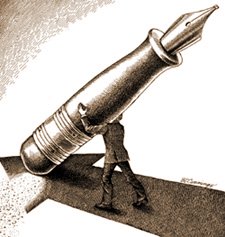
Suzanne Fields
http://www.jewishworldreview.com --
AMERICAN CHILDREN who aren't exactly 8 o'clock scholars often rate themselves as better
students than they really are. They don't know enough to know what they don't know.
It now turns out that many parents do that, too. In a study of several hundred mothers from
the United States, Japan and China about the school performance of their children in the fifth
grade, more than half of the American mothers announced that they were "very satisfied''
with their children's school work. But not true in Asia. Only 5 percent of the Japanese and
Chinese mothers came to that conclusion although they were more or less entitled to, since
their kids scored far above the Americans.
Adding insult to ignorance, the American mothers blamed their childrens' "nature'' for poor
performance, an inborn inability to do better. Asian mothers said their children didn't work
hard enough.
Tom Loveless, director of the Brown Center on Education Policy, calls this the parent trap,
with many parents part of the problem rather than the solution. The trap is a trap door many
parents fall through.
"(Reformers) assume that parents will do whatever is necessary to raise children's levels of
achievement,'' he writes in the Wilson Quarterly, published by the Woodrow Wilson
International Center for Scholars in Washington.
"But will they?''
Well-meaning parents who say they believe in school reform are often unwilling to make the
trade-offs necessary for their children to do better. In 1996, for example, the Gallup Poll
asked this question: "Which one of the following would you prefer of an oldest child -- that
the child get A grades or that he or she make average grades and be active in extracurricular
activities?''
Only 33 percent of the public-school parents preferred A grades; 56 percent favored a more
"well-rounded'' kid with average grades. If you think the answer is different for parents of
children in private schools, you're wrong. That breakdown was almost the same, 34 percent
opted for the A student and 55 percent chose average grades, as long as their child could be
a jock, cheerleader or even student council leader.
 |
No matter how good a teacher may be, parents who don't pay critical attention to what their children are learning in school, and how they spend time after school, contribute to lower academic standards.
Laurence Steinberg, a psychologist at Temple University, studied how American teens spend their time after school every week. The breakdown is depressing: 10 to 15 hours in sports, 15 to 20 hours working, 20 to 25 hours for dating, movies, socializing. The booby prize goes to homework: the national average is 4 hours.
With so much talk about school reform, an anti-intellectualism continues to haunt American parents and children. The research confirms what inner-city teachers know: Many black children who are good students suffer slings and arrows from their peers for "acting white.'' The white nerd with a slide rule and leaky pens in his shirt pocket is not a glamorous figure either, although computer whiz kids may be turning that image around.
It's not the latest news that education is likely to be the hottest issue in next year's presidential -- and congressional -- campaign. In the most universal sense educational policy is political. It determines what the next generation of children will learn and how they will think and act.
The Socratic notion of the crucial need to "know thyself'' is about education, understanding "thyself'' in relation to "facts'' about the universe. Today, however, it's often interpreted as a narcissistic exercise. Schools become "therapeutic'' environments inflating grades and egos on behalf of encouraging a child's self-esteem, rather than the genuine and justified self-esteem that flows from acquiring knowledge and skills.
What to do? We hear a lot about "soccer moms.'' How about "scholar moms'' (and dads) becoming a political force? They could help their children with their studies and get the attention of the politicians at the same time. There's more than one way to cross the bridge to the 21st century's reformed education. Parents must beware the trap
10/19/99: The male mystique -- he shops
10/13/99:The campaign of the Teletubbies
10/08/99: Money is in the eye of the art dealer
10/01/99: Lincoln's 'Almost Chosen People'
09/29/99: Introducing Bill and Hillary Bickerson
09/27/99: Must we wait for the next massacre?
09/24/99: Miss America meets Miss'd America
09/21/99: Princeton's 'professor death'
09/16/99: The Cisneros lesson
09/13/99: No clemency for personal politics
09/08/99: M-M-M is for manhood
08/30/99: Blocking the schoolhouse door
08/27/99: No kick from cocaine
08/23/99: Movies don't kill people
08/19/99: A rude awakening
08/16/99: Dubyah and that 'language' thing
08/09/99: Chauvinist sows -- oink oink

